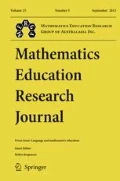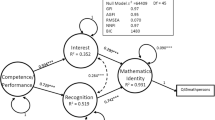Abstract
This article describes and explains shifts in participation among eight mathematically successful Latin@ undergraduate students who were enrolled in a culturally diverse calculus I workshop that was part of a university-based Emerging Scholars program. Two questions are explored: (a) How do students explain success-oriented shifts in participation that occurred over time in the workshop setting? and (b) How were these success-oriented shifts related to students’ evolving mathematical and racial identities? Drawing on Wenger’s (1998) social ecology of identity framework, the analysis shows that participants constructed strengthened identities of participation over time through three modes of belonging (engagement, imagination, and alignment) within two dimensions (identification and negotiability). Given the predominantly White university context, Latin@ Critical Theory was used to help uncover how strengthened participation was related to what it meant for participants to be Latin@. Findings also support intentional collaborative learning environments as one way to foster mathematics success and positive identity development among Latin@ students.
Similar content being viewed by others
Notes
We use Latin@ to represent both Latino and Latina identities (Gutiérrez 2013). This broad categorical variable encompasses identities associated with particular countries of origin. Our use of Latin@ also acknowledges that the meanings (externally ascribed and personal) for this term are under constant negotiation.
Initial group refers to the peer group participants self-selected into on the first day of class. Sometimes participants changed peer groups from one workshop meeting to the next and interacted with more than one peer group during a single workshop meeting.
References
Berry, R. Q., III. (2008). Access to upper-level mathematics: the stories of African American middle school boys who are successful with school mathematics. Journal for Research in Mathematics Education, 39(5), 464–488.
Delgado Bernal, D. (2002). Critical race theory, Latino critical theory, and critical raced-gendered epistemologies: recognizing students of color as holders and creators of knowledge. Qualitative Inquiry, 8(1), 105–126.
Esmonde, I., Brodie, K., Dookie, L., & Takeuchi, M. (2009). Social identities and opportunities to learn: student perspectives on group work in an urban mathematics classroom. Journal of Urban Mathematics Education, 2(2), 18–45.
Gutiérrez, R. (2013). The sociopolitical turn in mathematics education. Journal for Research in Mathematics Education, 41, 1–32.
Hsu, E., Murphy, T. J., & Treisman, U. (2008). Supporting high achievement in introductory mathematics courses: what we have learned from 30 years of the Emerging Scholars Program. In M. Carlson & C. Rasmussen (Eds.), Making the connection: Research and practice in undergraduate mathematics, MAA Notes (Vol. 73, pp. 205–220). Washington, DC: Mathematical Association of America.
Lave, J., & Wegner, E. (1991). Situated learning: legitimate peripheral participation. New York: Cambridge University Press.
Lee, J. M., Contreras, F., McGuire, K., Flores-Ragade, A., Rawls, A., Edwards, K., & Menson, R. (2011). The College Completion Agenda 2011 Progress Report: Latino Edition. College Board Advocacy & Policy Center. Retrieved January 11, 2013, from: http://completionagenda.collegeboard.org/latino/hispanic-population-growth.
Martin, D. (2000). Mathematics success and failure among African-American youth: the roles of sociohistorical context, community forces, school influence, and individual agency. Mahwah, NJ: Lawrence Erlbaum Associates.
Martin, D. (2006). Mathematics learning and participation in African American context: the co-construction of identity in two intersecting realms of experience. In N. Nasir & P. Cobb (Eds.), Diversity, equity, and access to mathematical ideas (pp. 146–158). New York: Teachers College Press.
Martin, D. (2009). Researching race in mathematics education. Teachers College Record, 111(2), 295–338.
McGee, E., & Martin, D. B. (2011). From the hood to being hooded: a case study of a Black male Ph.D. Journal of African American Males in Education, 2(1), 46–65.
Motel, S., & Patten, E. (2012). The 10 largest Hispanic origin groups: characteristics, rankings, top counties. Pew Research Hispanic Center. Retrieved August 24, 2012, from: http://www.pewhispanic.org/2012/06/27/the-10-largest-hispanic-origin-groups-characteristics-rankings-top-counties/.
Nasir, N. S. (2002). Identity, goals, and learning: mathematics in cultural practice. In N. Nasir, & P. Cobbs (Eds.). Mathematical Thinking and Learning, 4(2&3), 213–248.
Nasir, N. I. S., & Shah, N. (2011). On defense: African American males making sense of racialized narratives in mathematics education. Journal of African American Males in Education, 2(1), 24–45.
Oppland, S. (2010). The inextricability of identity, participation, and math learning among Latino/a undergraduate students. Unpublished Doctoral Dissertation. Chicago, IL.
Solórzano, D., & Delgado Bernal, D. (2001). Examining transformational resistance through a critical race and Latcrit theory framework: Chicana and Chicano Students in an urban context. Urban Education, 36(3), 308–342.
Solórzano, D., & Yosso, T. (2002). Critical race methodology: counterstorytelling as an analytical framework for education research. Qualitative Inquiry, 8(1), 23–44.
Spencer, J. A. (2009). Identity at the crossroads: Understanding the practices and forces that shape African American success and struggle in mathematics. In D. B. Martin (Ed.), Mathematics teaching, learning, and liberation in the lives of Black children (pp. 200−230). New York: Routledge.
Stinson, D. W. (2006). African American male adolescents, schooling (and mathematics): deficiency, rejection, and achievement. Review of Educational Research, 769(4), 477–506.
Stinson, D. (2008). Negotiating sociocultural discourses: the counter-storytelling of academically (and mathematically) successful African American male students. American Educational Research Journal, 45(4), 975–1010.
Treisman, P. U. (1992). Studying students studying calculus: a look at the lives of minority mathematics students in college. College Mathematics Journal, 23(5), 362–372.
Trucios-Haynes, E. (2000). Why race matters: LatCrit theory and Latina/o racial identity. Berkeley La Raza LJ, 12, 1.
Wenger, E. (1998). Communities of practice: learning, meaning and identity. Cambridge: Cambridge University Press.
Yin, R. K. (2009). Case study research: design and methods. Thousand Oakes, CA: Sage.
Zavala, M. D. R. (2012). Race, language, and opportunities to learn: the mathematics identity negotiation of Latino/a youth. Unpublished dissertation, University of Washington. Retrieved January 11, 2013, from https://dlib.lib.washington.edu/dspace/bitstream/handle/1773/20830/Zavala_washington_0250E_10481.pdf?sequence=1.
Author information
Authors and Affiliations
Corresponding author
Appendix
Appendix
Rights and permissions
About this article
Cite this article
Oppland-Cordell, S., Martin, D.B. Identity, power, and shifting participation in a mathematics workshop: Latin@ students’ negotiation of self and success. Math Ed Res J 27, 21–49 (2015). https://doi.org/10.1007/s13394-014-0127-6
Received:
Revised:
Accepted:
Published:
Issue Date:
DOI: https://doi.org/10.1007/s13394-014-0127-6




